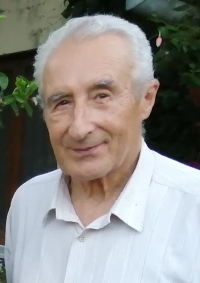Miner? And who is more that that!

Download image
Bořivoj Hytych was born on May 21, 1938 in Terešov, near Vyškov. He remembers hiding with his family in shelters or in a beet field towards the end of the war. The end of the war also had a bad effect on relations in the village - Terešov was half Czech and half German – a certain Nazi killed his children and wife and then committed suicide himself, and some Czech residents turned against their German neighbours and expelled them from the village. Bořivoj’s father was totally deployed during the war and after the communist coup he was branded a kulak and imprisoned for six months in a fabricated trial. This had an adverse effect on Bořivoj Hytych, as it made it very difficult for him to study at secondary school. In the end, he was able to get an education, but his problematic background as perceived by the communists caught up with him even in his first job - a savings bank, from which he was fired. He started working as a wrecker in the Ostrava mines, and later graduated from university there. He was also employed in the mines of Rosicko and then as an official of the State Mining Administration in Brno. In 2022, he lived with his wife in Brno.



